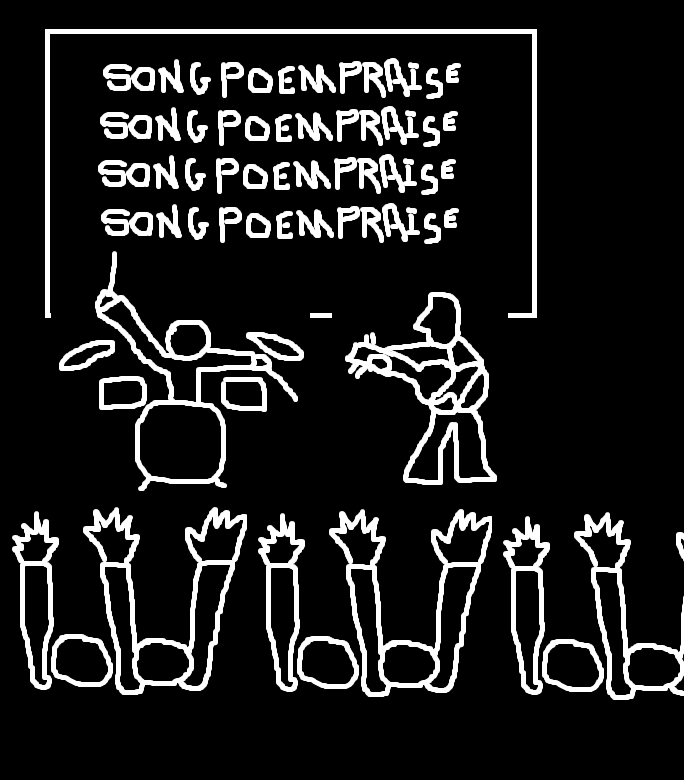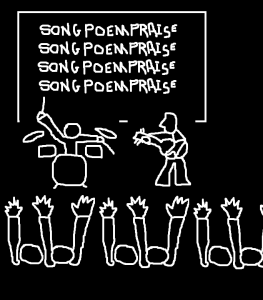
Photo by Casey Horner on Unsplash
We sing to, and of, a transcendent God. We cannot fully understand who he is or what he does. And that makes it hard to understand our relationship with him. It’s all an enigma wrapped in, well, you know . . . God and his ways are way beyond literal language to even begin to explain anything about these. So how in the world are we supposed to write songs about it all?
The same way that the biblical authors help communicate the mysteries of the God we worship. They use poetry. It’s what you need to use when you are trying to say something that cannot be said. And a key tool that poets use in their songs is metaphor. This is because metaphors are the best tools for dealing with complexity and mystery.
In Isaiah 64:6 God is the potter and we are the clay. God is compared to a hen in Psalm 91:4. And in Isaiah 42:14, to a woman in childbirth.
Even Jesus Christ, wholly God, used metaphors to explain who he was.
“I am the Bread of Life” (John 6:35).
“I am the Good Shepherd” (John 10:11).
“I am the vine; you are the branches” (John 15:5).
“I am the Light of the world” (John 8:12).
Most of life is mysterious and complex. A lot of things cannot be expressed or understood directly or simply. In order to express what is inexpressible, and explore the unknowable, we make comparisons to something else.
But metaphors do more than help us explain and understand things. In the hands of a skilled poet, they activate our imaginations.
Understanding Metaphor
Before we get into some examples, we need to get some of the technical explanations out of the way. This is very important, for if you don’t make the comparisons correctly, they will be ludicrous, not magical.
A metaphor has two parts: the thing you are describing (A) and the thing you are comparing it to (B). In the metaphor, “The wind howled,” the wind (A) is compared to a wolf (B). Note that you can name or imply either part of the comparison. In this case, A is named and B is implied.
Just a few other related terms, that you probably remember from high school. A simile is a comparison, but it is indirect, usually using the words “like” or “as”: “The wind sounded like the howling of a wolf.” Personification is a type of metaphor when B is a person–“The wind whispered through the leaves.” The term metaphor can be used to refer to the general category that includes the metaphor proper, as well as simile and personification.
Importantly, the B part of the comparison is very important–if you say the wind howled, you are communicating a feeling that there is something sinister about it. If the wind is whispering, it’s a lot less lonely.
Mixed Metaphors
When you write a song, you want to be careful with metaphors. You don’t want to accidentally write (or select) a song for worship with a mixed metaphor. These are embarassing, because there are still people out there who know one when they see one. So what is a mixed metaphor?
First, here are two wonderful metaphors that Jesus uses for himself:
“I am the good shepherd, . . . and I lay down my life for the sheep.”
“I am the bread of life, whoever comes to me will never grow hungry.”
These are both legit metaphors, but if we mix them we have
I am the bread of life, and I lay down my life for the sheep.
The comparison is nonsensical. Bread doesn’t lay down its life for anything, let alone sheep.
Unlike a metaphor, this silly comparison does not lead to deeper reflections on who Jesus is, it just leaves us puzzled, or shaking our heads.
I’ve only sung Needtobreath’s “Multiplied” one time, and it was memorable for all the wrong reasons. I remember it because of the problems with metaphor.
Your love is like radiant diamonds
Bursting inside us we cannot contain
Your love will surely come find us
Like blazing wild fires singing Your name
In this verse, we have God’s love (A) being compared to “diamonds bursting inside us” (B). It makes sense to compare God’s love with something as beautiful, multifaceted and long-lasting as a diamond. It also makes sense to compare the feeling of being loved by God as a “bursting” sensation. But it doesn’t make sense to compare anything to a bursting diamond, because that’s not what diamonds do. In the last line has a similar problem: “blazing wildfires” don’t sing. Both of these are mixed metaphors.
Chris Tomlin’s “Amazing Grace: My Chains Are Gone” also suffers from a problem with a mixed metaphor.
The chorus that Tomlin added to the most beloved of hymns climaxes on a mixed metaphor.
My chains are gone
I’ve been set free
My God, my Savior has ransomed me
And like a flood His mercy reigns
Unending love, amazing grace
“Like a flood, his mercy reigns” is a mixed metaphor. It is saying that God’s mercy is like a reigning flood. But floods don’t reign. This is like saying, “Like a flood, his mercy shines.” Or soars, or melts, or skates.
Floods flow. They overwhelm. They cover and destroy. They glut, stream, spate, and surge. For various reasons, none of these work very well as a replacement for reign–but, hey, it’s very is hard to write good poetry, but if we are going to write poetry to be used for the glory of God, it ought to be good. And mixed metaphors are not good. They are bad.
The Magic of Metaphor
When metaphors are done correctly, they can be magic. Let’s start by looking at a poem written by a pro. Here is Robert Frost’s “Bereft”:
Where had I heard this wind before
Change like this to a deeper roar?
What would it take my standing there for,
Holding open a restive door,
Looking down hill to a frothy shore?
Summer was past and the day was past.
Sombre clouds in the west were massed.
Out on the porch’s sagging floor,
Leaves got up in a coil and hissed,
Blindly struck at my knee and missed.
Something sinister in the tone
Told me my secret must be known:
Word I was in the house alone
Somehow must have gotten abroad,
Word I was in my life alone,
Word I had no one left but God.
As with all great poetry, there is so much more going on here than metaphor, but the metaphors are wonderful.
In line two, the sound of the ocean turns into a roar, which suggests a lion, and in line 11 the tone is “sinister.” In line four, the door is “restive,” meaning it’s unable to keep still–like a person, so this is personification. There is more personification in the “sombre” clouds. All these metaphors combine to suggest turmoil within the speaker and a sense of some sort of danger. The threat increases as the leaves are metaphorically compared to a snake in lines 9-10.
When the stormy conditions are described metaphorically, we can imaginatively understand the complex feeling the speaker is experiencing–it is a particular kind of loneliness–loneliness mixed with existential fear. Even if we’ve never before experienced this feeling ourselves, we know just a little about what it feels like because we’ve read the poem. Frost has described an indescribable feeling to us through metaphor. That’s the power of metaphor. Can you imagine how much more profound our singing-worship would be if we used metaphor in this way?
A Metaphor that Works: “My Lighthouse”
I’ve written previously about the wonderful metaphors used by Katheryn Scott in “At the Foot of the Cross.” Scott’s metaphors are great examples of how to effectively use standard comparisons that lead to deeper worship.
[click_to_tweet tweet=”Metaphors in our worship songs can help us express what is inexpressible, and explore the unknowable, but they can also activate our imaginations. #praiseandworship #worshipleader #worship” quote=”Metaphors in our worship songs can help us express what is inexpressible, and explore the unknowable, but they can also activate our imaginations.”]
“My Lighthouse” from Rend Collective Experiment employs an extended metaphor, a comparison that is extended through the whole song.
Verse 1In my wrestling and in my doubtsIn my failures You won’t walk outYour great love will lead me throughYou are the peace in my troubled sea, whoaYou are the peace in my troubled seaVerse 2In the silence You won’t let goIn the questions Your truth will holdYour great love will lead me throughYou are the peace in my troubled sea, whoaYou are the peace in my troubled seaChorusMy lighthouse, my lighthouseshining in the darkness I will follow You whoaMy lighthouse, my lighthouseI will trust the promise You will carry me safe to shoreTagSafe to shore, safe to shore, safe to shoreVerse 3I won’t fear what tomorrow bringswith each morning I’ll rise and singMy God’s love will lead me throughYou are the peace in my troubled sea, whoaYou are the peace in my troubled sea
Oh You are my lightBridgeFire before us, You’re the brightestYou will lead us through the storm
Sometimes our life is like a “troubled sea.” Notice that the troubles aren’t general and abstract; they are of a particular kind of trouble. They are not in the categories of lost car keys or bankruptcy or divorce. What stirs up these waves is a lack of trust. The forces behind these turbulent waters are wrestling, doubts, questions, failures, and God’s silence–a lack of trust in God. The metaphor invites us to look beyond our troubles to hat which we can trust to take us through them–to the lighthouse.
Lighthouses have two functions: to warn ships of danger and to guide them to safe harbour. Remembering God’s promises will shift our focus from the dangers of doubt; the lighthouse will guide us “safe to shore.” Christ and his promises are a guiding light when we are on the dark and stormy seas, when we struggle with trusting God.
The metaphor doesn’t simply tell us that we can trust in God in our troubles, it places us on a boat, caught in a storm off of the coast (of Ireland I imagine) and it shows us a lighthouse through driving wind and rain. We can trust the lighthouse to guide us. And then, as we sing, we discover we will be all right, not by our own strength, but by looking to him.
That is the magic of metaphor.
Posts in this series:
The Poetry of Worship: The Sacrifice of Praise (1)
The Poetry of Worship: Diction (2)
The Poetry of Worship: Developing a Poetic Ear (3)
The Poetry of Worship: Unity and Focus (4)
The Poetry of Worship: Avoid the Abstract (5)
The Poetry of Worship: Sound (7)




 Occasionally, during corporate worship, my focus is taken away from the God who is deserving of all my praise and drawn to the words upon the screen. Although I try to resist the distraction, it’s not easy. Sometimes I am diverted by a bit of bad theology. Yesterday, I chuckled because a line was just weird. Other times, it’s because I notice the words don’t really mean anything or are cliche. And then there’s the mediocre, or even bad, poetry.
Occasionally, during corporate worship, my focus is taken away from the God who is deserving of all my praise and drawn to the words upon the screen. Although I try to resist the distraction, it’s not easy. Sometimes I am diverted by a bit of bad theology. Yesterday, I chuckled because a line was just weird. Other times, it’s because I notice the words don’t really mean anything or are cliche. And then there’s the mediocre, or even bad, poetry.


